12 months of 10 Questions: Meet some of the fascinating lawyers we profiled in 2016
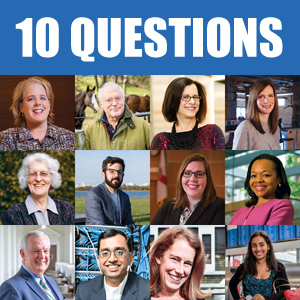
Through the ABA Journal’s monthly 10 Questions feature, reporter Jenny B. Davis spent 2016 speaking to legal professionals of all different backgrounds and walks of life. Here are the 12 fascinating people we got to know this year, along with an abridged introduction and some of the questions they answered.
Roberta Kaplan: From lesbian moms to Airbnb, she makes sure laws keep pace with change
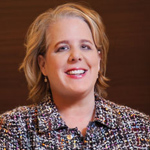
Roberta Kaplan could be described as a specialist in emerging law. She litigates cases that shape the legal structure within which Americans live, love, work and hail cabs. A Paul, Weiss, Rifkind, Wharton & Garrison partner in New York City, she successfully argued U.S. v. Windsor before the U.S. Supreme Court in 2013, winning a landmark verdict that struck down the Defense of Marriage Act. Her book about the case, Then Comes Marriage: United States v. Windsor and the Defeat of DOMA, was published last fall. And she’s achieved significant legal victories on behalf of sharing-economy clients like the international lodging-arrangement company Airbnb.
Q. “In your book, you share personal stories—about coming out to your mother and when you and your wife experienced discrimination at the hospital following the birth of your son. Was this always part of the plan?”
A. “No. In the proposal, there was very little about that. But as I started to put it together with my editor, it really occurred to me that this isn’t a story about just winning at the Supreme Court; it’s about changing American minds. I realized I couldn’t tell that story without explaining how American minds had changed within the course of my lifetime.”
Jeffrey Seder: Want to find the next Triple Crown winner? Talk to him
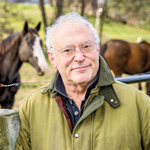
Last fall, American Pharoah galloped into history as horse racing’s first-ever Grand Slam winner. For the uninitiated, that means a clean sweep of the Triple Crown plus the Breeders’ Cup. But this legendary thoroughbred wasn’t always a sure bet. He flubbed his first race, and his owner had even tried to sell him, until Coatesville, Pennsylvania, lawyer and racehorse expert Jeffrey A. Seder intervened.
Q. “Is it true you told American Pharoah’s owner not to sell him?”
A. “That’s true. We’d been working with American Pharoah’s owner for about five or six years. He bred this horse. He’s Egyptian, and when the Arab Spring came, his partnerships in Egypt froze his money. I suppose that’s why he decided to sell this horse—he thought he might get a million bucks for him at the yearling auction. My job is to tell him what horses to buy and what to sell, and I told him that if he needed money, he should sell his house, not this horse.”
Beth Heifetz: This DC lawyer is helping her firm attract US Supreme Court clerks
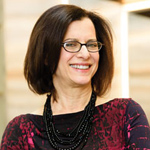
Beth Heifetz knows what judicial clerks want. As head of the Jones Day issues and appeals practice group and director of judicial clerk recruiting, it’s her job to bring U.S. Supreme Court clerks on board—and she rocks it, writ large. For the past four years, the firm has welcomed more clerks than any other law firm in the nation. Last year, that number totaled 10, or more than one-fourth of all clerks coming off their stint at the high court. Jones Day’s winning bid seems to be a special blend of cutting-edge casework, camaraderie with other clerks and personal career guidance from Heifetz herself—a style of mentorship she honed during her own clerking stints, first for Judge Abner Mikva of the U.S. Court of Appeals for the District of Columbia Circuit and then for Justice Harry A. Blackmun of the Supreme Court.
Q. “You were recently named by President Barack Obama to the governing body of the United States Holocaust Memorial Museum. Do you have a personal connection to the museum?”
A. “I got involved in the museum through its Washington lawyers committee, but sadly I have many family members who were killed in the Holocaust. They were Polish and Russian; they weren’t murdered in concentration camps—they were herded from ghettos, taken to pits and shot. My grandfather had already come to America by then, but two of his brothers in what is now Belarus escaped from the ghetto and survived by living in the forest for two years. When I was growing up, one of these great-uncles lived down the street with his wife, who he met in the forest. I knew the stories, but only in the shadows. I wish they had talked about it more.”
Julianne Walsh: From stay-at-home mom to working as a lawyer in the tech sector

A year into her new position as attorney-in-residence at Nextpoint, a litigation management software and support company, Julianne Walsh faces none of the challenges of her last gig. Leading advanced cybersecurity webinars does not involve singing the ABCs. The lawyer-clients she strategizes with generally remember to say “please” and “thank you.” And she has yet to pick up a sippy cup in a corner office or boardroom. Returning to work after five years as a stay-at-home mom wasn’t easy, but this Chicago lawyer made it work, as she has in the past.
Q. “There’s been much written about the tension between working moms and stay-at-home moms. Did you ever experience that?”
A. “Definitely. There’s a lot of judgment, especially when you have a law degree. People think you’re wasting your education if you’re not actively using your degree. Who knows why people think that? Maybe they wish they could stay home. But I’m happy with my life, and I am not going to justify any of my choices for those folks. I learned better multitasking and negotiation skills from my kids than any job I have ever had.”
Phyllis Randolph Frye: Groundbreaking transgender judge happily passes the torch
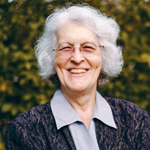
Phyllis Randolph Frye is the first openly transgender judge in the nation. The New York Times has called her the grandmother of the transgender movement. This year, she and her wife will celebrate their 43rd wedding anniversary. But life wasn’t always so kind to this Houston lawyer. Frye started living as a woman 40 years ago, before the Internet, before Tootsie and Transparent, and well before Caitlyn Jenner. She endured unspeakable discrimination. She lost jobs. She faced arrest. Her neighbors slashed her tires and spray-painted slurs on her driveway. During law school, the organization of religious students she had joined even refused to pray with her. Through it all, Frye never gave up the fight—for acceptance, for opportunity, for political power and legal legitimacy.
Q. “Despite so many challenges, you’ve always maintained an unwavering self-respect and sense of dignity. Where do you think that comes from?”
A. “I think it had a lot to do with being an Eagle Scout and being a real achiever in high school. I have always been proud of the fact that I went to college on an ROTC military scholarship as part of a congressional program for only 200 students in the country. That does something to you—it makes you feel like maybe you are something.”
Keith Porcaro: Crafting tech solutions for legal aid

What if you could walk into a legal aid office and, by simply tapping out some answers to an on-screen questionnaire, get immediate advice, connections to social services and more? This seemingly simple scenario drives Keith Porcaro. As general counsel and head of technology and development at Social Impact Lab, a small nonprofit based in Washington, D.C., this web developer-turned-lawyer is mapping out the myriad paths and problems involved in the delivery of government and social services, and he’s devising innovative, technology-driven processes to streamline it all.
Q. “What technology do you use in your daily life? Is it like the Jetsons at your house?”
A. “Oddly enough, I’ve tried to be more diligent about not being all that gadget-crazed. I enjoy having an Amazon Echo, but my iPhone has most of the notifications disabled and is nearly always silenced.”
Robyn Crawford: Putting people behind bars before she could legally have a drink
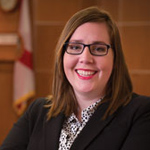
In May, Florida lawyer Robyn K. Crawford marked her first full year as an assistant state’s attorney. She is 21 years old. Yes, Crawford was handling a caseload of up to 220 files before she could legally drink a beer, and she’s both the senior-most lawyer and the youngest lawyer in the misdemeanor division of the 5th Judicial Circuit’s Citrus County office. How did someone so young go so far so fast? Hard work, of course. But Crawford has been laser-focused on the law ever since she participated in a youth court criminal diversion program for first-time offenders. At the tender age of 20, Crawford passed the bar and scored her dream job.
Q. “You have said that participating in youth court inspired you to become a lawyer and work with young people. Now that you’ve been a prosecutor for a year, does this still drive you?”
A. “Yes. I am still passionate about working with juveniles. It’s never just kids acting out. There are always other reasons behind it. With these cases, you work with people in other agencies—the Department of Children and Families, the Department of Juvenile Justice—to try to make the best decision for a juvenile who’s acting out and committing a crime. The purpose is not to punish but to rehabilitate. You can help them. You can stop them before their actions have much higher consequences.”
Kristen Clarke: A leader in 21st century fight for civil rights
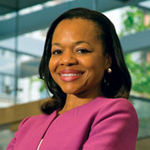
For anyone who thinks the civil rights movement is defined by grainy 1960s news footage and austere, mostly male advocates, meet Kristen Clarke. Through leadership roles at the NAACP Legal Defense and Educational Fund, the Justice Department and the New York State Attorney General’s Office, this dynamic lawyer has been on the forefront of the 21st century civil rights movement, fighting on behalf of the nation’s most vulnerable citizens over issues of race, gender and sexual orientation. In January, Clarke became president and executive director of the Lawyers’ Committee for Civil Rights Under Law. This Washington, D.C.-based group was formed in the 1960s at the behest of President John F. Kennedy to galvanize the private bar in the fight for equal justice, but it’s never been more relevant—and more necessary—than it is today.
Q. “Where did your sense of social justice come from—from your parents, or maybe along your educational journey from boarding school to Harvard University and Columbia Law School?”
A. “My parents immigrated to Brooklyn from Jamaica a few years before I was born. They wanted their kids to have access to better schools and greater opportunities than what existed on the island. I grew up in a household that was about discipline, working hard in school and about making the most of every opportunity. I’ve been blessed to have had amazing opportunities. I’ve experienced what it’s like to be underprivileged, and I’ve experienced very privileged settings as well. I feel a deep sense of responsibility to use the opportunities that I have been given to help those less fortunate. We live in a nation that’s divided along lines of race and class. I have a personal sense of what life is like on both sides of that divide, and I want to figure out how we close some of those gaps and level the playing field.”
Phillip Stone: Helping revive the Southern institution of Sweet Briar College
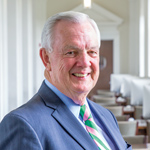
When Virginia lawyer Phillip C. Stone took the helm at Sweet Briar College, bringing it back from the brink of closure took skill, expertise and sheer determination. Just last year, Sweet Briar’s leadership had decided to close the college down, citing fatal financial problems. But a group of determined alumnae refused to let their beloved alma mater go. Protests and lawsuits ensued, all culminating in a summertime settlement that ensured classes could remain in session—at least in theory. When Stone, Sweet Briar’s newly appointed president, arrived on July 2, 2015, the campus was quiet. Too quiet. There were no professors. Few staff. No students. Even the horses in the college’s fabled stables were gone. But Stone had experience in small college turn-arounds: Under his leadership, Bridgewater College, about 80 miles northeast, had increased its enrollment 78 percent and raised more than $40 million for its endowment. So, as Sweet Briar leaders had been doing for more than a century before him, Stone rolled up his sleeves and got to work.
Q. “Your ‘Day One’ situation sounds pretty dire. What were the initial challenges you faced when you came to Sweet Briar, and what did you do first?”
A. “When I came to the campus over the July 4th weekend in 2015, my first act was to arrange for the technology people to post an announcement on the website to rehire all faculty and staff, sight unseen. I had hundreds of emails that first day. In those first few weeks, I put an interim team in place and worked with faculty leadership to identify who could be convinced to stay. In some cases, entire departments were gone. That gave us about five weeks to get a new food service, get our renowned horse-riding program back, get our junior-year-abroad program back and get our sports teams back on game schedules. There was also the little matter of recruiting students. We had none. I was working 16-to-18-hour days. People were feeling sorry for me. They brought me pie.”
Raj De: From the 9/11 Commission to the White House to the NSA

Nearly 20 years ago, a young Harvard Law School student named Raj De sat in his mentor’s office and explained why he’d decided to bypass BigLaw for the Department of Justice. The older lawyer understood completely. “You should always go where the action is,” he counseled. De took this advice—and then some. Leadership roles at the DOJ? Check. 9/11 Commission? He was a part of it, serving as counsel and contributing to its historic final report. Then came two dizzyingly busy years at the White House, where De worked directly with President Barack Obama as staff secretary. The follow-up? Three years as general counsel to the National Security Agency, where he helped steer the agency through perhaps its biggest crisis—the leak of countless classified documents by former contractor Edward Snowden. De left the NSA last March for the private sector, returning to the Washington, D.C., office of Mayer Brown to direct the firm’s global cybersecurity and data privacy practice.
Q. “You advocate transparency, but could Snowden’s actions be seen as the ultimate in transparency?”
A. “It’s possible to think that the discussion the public is having about digital privacy and surveillance is a positive thing, but that doesn’t mean that what Snowden did was justifiable or a positive thing in and of itself. I do think that this dialogue is important, but I really think that what he did was a terrible, self-aggrandizing and reckless thing. It’s a complex global environment, and I am not sure the general public fully understands how complicated the threat scenario is and how sophisticated our intelligence apparatus needs to be. I think the trick for us as a society is: How do we manage the persistent threat landscape and stay true to the values we hold dear?”
Shannon Liss-Riordan: Defending workers in the sharing economy
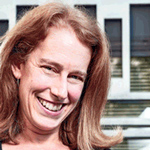
Nicknamed “Sledgehammer Shannon,” this Boston lawyer doesn’t take on cases; she takes on industries. She’s forced restaurants, clubs and caterers across the country to fairly tip their servers. She’s won fair wages for delivery drivers, exotic dancers, call center workers, house cleaners, cable guys and more, and she’s taken on corporations and institutions such as FedEx and Harvard University. Now, Shannon Liss-Riordan and her Boston-based firm are at the forefront of employee misclassification cases that emerge from the new “sharing economy.” It’s the latest challenge in a career spent winning higher wages and better treatment for hardworking Americans.
Q. “You’re one of only a handful of practicing lawyers in the country who also owns a pizza parlor. After you successfully represented employees in a lawsuit against a chain of pizza restaurants, the restaurants ended up on the auction block and you bought the Harvard Square location. How has being this type of business owner affected how you approach your practice?”
A. “It’s given me good perspective on the kinds of things employers deal with. I think about what it means to be a good employer. Even though I have excellent managers, it’s a lot of work; and I don’t underestimate what business owners go through. But my job is always to make sure businesses think about their employees and do not cross the lines that have been drawn by the laws.”
Anita Dhake: Leaving BigLaw to travel the world

Where in the world is Anita Dhake? That question used to be pretty easy to answer because the 34-year-old former associate spent most of her waking hours behind a desk at Skadden, Arps, Slate, Meagher & Flom. Now, however, she could be anywhere—Alaska, Australia, Colombia, Thailand. That’s because Dhake left her firm last fall—she prefers the term retired—to become a full-time world traveler and blogger. She’s not independently wealthy, and she didn’t win the lottery. Instead, she spent years following a time-honored financial technique called saving money. Now Dhake is helping others do the same thing through her blog, the Power of Thrift. There, she pens a variety of posts, including observations on life and love, humorous travel notes and, to the delight of her growing audience of aspiring young retirees, candid financial advice about the strategies she uses to maintain her life on the road.
Q. “How do you decide where you’re going next?”
A. “I ask myself: What do I want to learn? Where have I never been? Where do people I love live who want to hang out with me? I also try to minimize, if not eliminate, my time in cold weather. I hate the cold.”
Photo Credits: Photo of Roberta Kaplan by Len Irish. Photos of Jeffrey Seder, Phillip Stone, Raj De and Shannon Liss-Riordan by David Fonda. Photo of Beth Heifetz by David Hills. Photo of Julianne Walsh by Wayne Slezak. Photo of Phyllis Randolph Frye by Todd Spoth. Photo of Keith Porcaro by Al Drago. Photo of Robyn Crawford by Doug Scaletta. Photo of Kristen Clarke by Arnie Adler.



